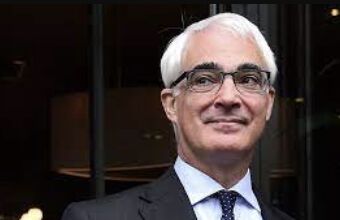Former British Finance Minister Alistair Darling, Architect of Economic Recovery, Passes Away at 70 After Battle with Cancer
Former British finance minister Alistair Darling, known for his leadership during the global financial crisis, has sadly passed away at 70 after battling cancer. He oversaw significant rescue efforts and was highly regarded by politicians from all parties.
Former British finance minister Alistair Darling, known for his pivotal role in steering the country's economy and banking system through the global financial crisis in 2007-08, has sadly passed away at the age of 70 after battling cancer, according to his family's announcement on Thursday. Darling, who was appointed Chancellor of the Exchequer by former Prime Minister Gordon Brown in June 2007, took charge just as the crisis was intensifying within major financial institutions worldwide. During his tenure, Darling oversaw significant rescue efforts, including the state-backed rescue of Northern Rock, which faced the first run on a retail bank in Britain since the 1800s. He also led a government bailout of Royal Bank of Scotland, Lloyds TSB, and HBOS, amounting to £37 billion ($47 billion) in order to safeguard them from the credit crunch.
Alistair Darling was the man that alongside Brown, shielded us from ruin during a global financial crisis. Darling served in a government of decent, talented, moral professionals that just quietly governed with integrity in the public interest. A far cry from where we are now.
— Supertanskiii (@supertanskiii) November 30, 2023
This move effectively resulted in the nationalization of some of the country's largest banks. Born in 1953 in Scotland, Darling attended the prestigious Loretto School and later studied law at Aberdeen University. Prior to his political career, he worked as a lawyer before becoming a barrister in 1984. Darling served as a Member of Parliament for the Labour Party from 1987 to 2015 and held various ministerial positions before assuming the role of finance minister under Brown's leadership. Described by friends as a clever, calm, and rational man with a sharp sense of humor, Darling was highly regarded across party lines.
Tributes poured in from politicians belonging to all major parties, highlighting his intellect, kindness, and ability to handle immense political pressure. Former Prime Minister Tony Blair praised Darling, stating, "I never met anyone who didn't like him...always kind and dignified even under the intense pressure politics can generate." Darling's foresight regarding the severity and long-lasting impact of the financial crisis became evident when the collapse of Lehman Brothers in September 2008 triggered a global credit market freeze.
Recounting a tense moment during the crisis, Darling revealed receiving a phone call from the chairman of RBS, on the verge of the bank running out of money. His swift action, instructing officials and executives to work through the night while ordering Indian cuisine to fuel their efforts, ultimately led to the government's decision to nationalize significant portions of the banking sector. In 2014, Darling chaired the cross-party Better Together campaign, successfully advocating for Scotland to remain part of the United Kingdom during the referendum.
His ability to garner respect from politicians across the political spectrum attested to his profound impact and dedication to public service. In his tribute, current Prime Minister Rishi Sunak of the Conservative party described Darling's passing as a "huge loss to us all," emphasizing his unwavering commitment to serving the country during challenging times. As the government's top financial cabinet member, Darling played a pivotal role in safeguarding the economy from a more extensive collapse amid the global turmoil that unfolded in 2008.




